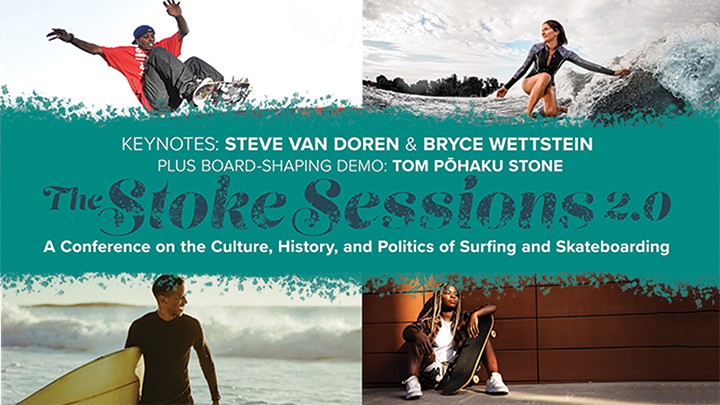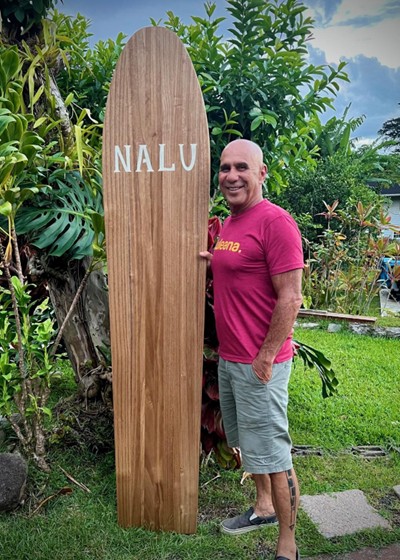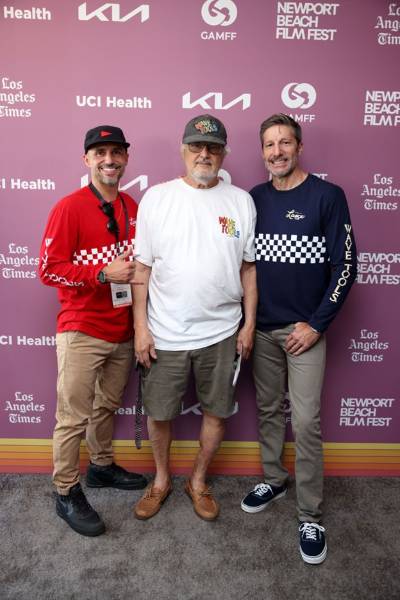SDSU hosts surf/skate conference to highlight culture, craft and community
Vans V.P., Olympic skateboarder and Native Hawaiian surfboard master craftsman come to campus for The Stoke Sessions 2.0 on Oct. 9–12

At San Diego State University, research on surf/skate culture brings communities together.
The Stoke Sessions 2.0 conference (Oct. 9–12 at SDSU) is a labor of love connecting local and international surf and skate scholars and experts with students and the public — it is a chance to engage in a comprehensive examination of surfing, skateboarding, and other board sports.
The conference, free and open to the public, features 20+ panels, three film screenings, networking events, a paddle out and skate session. This is the third surf/skate conference held at SDSU and at the 2023 event, Tony Hawk and Steve Hawk were keynotes.
This year keynote speakers Steve Van Doren, Vans Shoes vice president of events and promotions (and son of Paul Van Doren one of Vans' co-founders), and Bryce Wettstein, a two-time Olympian skateboarder (Tokyo and Paris) will kick off the conference at 6:30 p.m. on Thursday, Oct. 9 in Conrad Prebys Aztec Student Union Theatre.
David Kamper, co-director of the center and chair of the Department of American Indian Studies, will introduce the speakers who will speak about skateboarding’s global reach. Neftalie Williams, director of the Center for Skateboarding, Actions Sports, and Social Change, will moderate the conversation.
“We are thrilled to welcome Steve Van Doren and explore the incredible legacy of Vans across skateboarding, surfing, snowboarding, music, and virtually every facet of youth culture,” said Williams. “His insights will help students understand how to build and sustain a culturally relevant business across generations. As the perfect complement Bryce Wettstein will share her journey as an Olympian, professional skateboarder, and college student — offering a powerful perspective that will inspire students and highlight the intersection of skateboarding, business, media, and culture.”
Together, these conversations reinforce SDSU, the Center for Skateboarding, Action Sports, and Social Change, and the Stoke Sessions as the premier hub for skateboarding and action sports.
Conference panels focus on six tracks or areas of research: boardsports and social/political expression; access to space, place and belonging; therapeutic and adaptive boardsports; surfing and skateboarding in (or not in) the Olympic movement; aesthetics of boardsports; and sustainable practices.
Panels include: Smithsonian Traveling Exhibition - “Mash-Ups & Mirrors: The story of skateboarding in America, 1960 to Today,” Managing Coastal Erosion at San Onofre State Beach, Surfing and Skating Gendered Norms, Wellbeing in Board Sports, The 'Eyes' and Lines of Board Sports, and The Politics (or Lack Thereof) of Surfers and Skaters.
 Tom Pōhaku Stone
Tom Pōhaku Stone
Native Hawaiian (papahe’enalu) surfboard-making demonstration
Special guest Tom Pōhaku Stone, a Native Hawaiian cultural practitioner, master craftsman and educator, will shape a Native Hawaiian surfboard (papahe’enalu) out of an 80 pound slab of redwood for two days during the conference on Friday and Saturday, Oct. 10-11 at Tula Community Center. Students and anyone interested are invited to actively engage in the hand-building process, and at the same time learn about Native culture while making an original board that will reside on the SDSU campus.
Stone emphasized that this project, based on cultural accuracy, will be an all-inclusive project. “In Hawaiian, it’s a kākou thing — it's an all-of-us thing. We very much like to see that perpetuated,” he said. “It's party time — Hawaiian style. It's also really, really satisfying when you figure out how to work the planer.”
Stone will guest lecture at Professor Michael Roberts’ class, Cultural and Historical Origins of Surfing (SOC-330) before the conference. Stone believes that when students get excited about something, it's an avenue into more forms of study and research. At SDSU, the Center for Skateboarding Action Sports and Social Change, the Center for Surf Research, and the Surf/Skate Collaborative, provide students with research support.
“In Hawaiian culture, when you make a lei, when you compose a mele, when you make a surfboard — you're putting your intentions into that thing — your mana, your essence,” said Stone’s wife Anne, whom he met 32 years ago in a class at the University of Hawai’i, Mānoa. “When people come and participate in putting their mana into a board, it makes that board more special for us.” Stone also points to the aspect of a visceral connection that people find when building a board — where relating to this physical object can lead to interest in doing more research and ultimately understanding history in a different way.
Stone and his wife built 12 heʻe hōlua sleds for the “Chief of War” historical drama series on AppleTV+ starring Jason Momoa. These are what Native Hawaiians used to sled down mountains some 2,000 years ago and in the 1990s an effort to revive the sled making began — led by Stone. He laughed when he said, “The crazy thing is it [the series] introduced the world to what we've been doing for 30 years.”
 Tony Gentile, Lance Collins, and Robert Helphand
Tony Gentile, Lance Collins, and Robert Helphand
SDSU alumnus presents new surf documentary
Alumnus Robert Helphand (‘96 M.A. telecommunications and film) will preview his new award-winning film, “Shaping the Future: the story of Lance Collins.”
Helphand is an award-winning executive producer and independent filmmaker based in Los Angeles. The impetus for the documentary that follows Wave Tools founder Lance Collins, began early in Helphand’s life. When he was 12, his mom drove him from Glendale to Newport Beach to purchase a Wave Tools surfboard. “My mom splurged on it ($300-350 in 1980 dollars), and to this day, it's the most amazing gift I've ever been given — because it literally changed the trajectory of my life,” Helphand said.
He kept a connection with Collins throughout the years, and as an adult, Helphand and his friend, fellow surfer, and film partner Tony Gentile, made an 11-minute short film about three people who collect vintage ‘80s surfboards (one of whom is Helphand). In “The Collectors vol. 1.,” Collins provided the introduction shots where he appears actively shaping a board.
In early 2020, Helphand and Gentile recognized that Collins’ story deserved more than a short film — it needed a full-length documentary. They set out to explore his life journey in greater depth, highlighting how he built the American Dream through perseverance and masterful board-shaping, beginning with the shop he opened in 1969. Their goal was to honor a legendary businessman whose influence resonated deeply with surfers throughout the 1970s and ’80s — despite a few highs and lows. Through countless interviews, Helphand found Collins to be an endlessly fascinating and endearing figure. “It was like peeling back the layers of an onion,” he said.
One of the most rewarding moments for Helphand was seeing the words “SOLD OUT” on the marquee at The Lido Theater, in Newport Beach at the premiere (with Collins in attendance) last October. Helphand said Collins was surprised that people actually remembered him. “He was just blown away at how excited people were. That turnout was just mind-blowing.”
The film screening takes place on Friday, Oct. 10 at 6:30 p.m. in Hardy Tower, 140.
Visit sdsu.edu/stoked for the conference schedule and details.
SDSU conference sponsors include: the Surf/Skate Collaborative, Center for Skateboarding, Action Sports and Social Change, College of Arts and Letters, Center for Surf Research, Department of Sociology, MALAS, Center for Public and Oral History, Department of History
